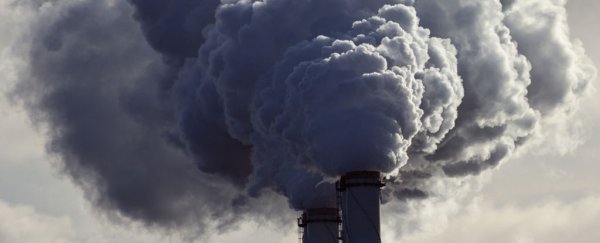The Trump administration has formally announced its plan to repeal the Clean Power Plan – President Obama's key policy to cut greenhouse gas emissions produced by power plants.
The decision, announced by EPA chief Scott Pruitt on Monday, was widely expected but still comes as a blow to advocates for the environment, and follows a pledge to abandon another measure to protect the atmosphere from dangerous pollutants, the Paris climate agreement.
"The war on coal is over," Pruitt said at an event in the town of Hazard, located in the coal heartland of Kentucky.
"The EPA and no federal agency should ever use its authority to say to you: we are going to declare war on any sector of our economy."
The goal of the Clean Power Plan (CPP), announced by Obama in 2015, was to reduce carbon dioxide (CO2) emissions from electrical power generation by 32 percent by 2030 (relative to 2005 levels), to be achieved by lessening the impact of coal-fired power plants and increasing the use of renewable energy.
But while the decision to scrap the initiative will be seen as a backward step in US efforts to curb carbon emissions, in truth the CPP was already effectively held back by congressional and legal challenges, resulting in the US Supreme Court halting the enforcement of the plan last year.
Nonetheless, the reaction from defenders of the stalled scheme has been unequivocal.
"With this news, Donald Trump and Scott Pruitt will go down in infamy for launching one of the most egregious attacks ever on public health, our climate, and the safety of every community in the United States," the executive director of environment non-profit Sierra Club, Michael Brune, said in a statement.
"He's proposing to throw out a plan that would prevent thousands of premature deaths and tens of thousands of childhood asthma attacks every year."
In an order to be signed Tuesday, Pruitt will declare that the Clean Power Plan overstepped the EPA's legal authority in attempting to force power companies to reduce carbon emissions, which penalised utilities, especially coal-fired plants that could not reasonably meet the goals.
"When you think about what that rule meant, it was about picking winners and losers," Pruitt said.
"The past administration was using every bit of power and authority to use the EPA to pick winners and losers and how we generate electricity in this country. That's wrong."
But while the new EPA proposal will seek to tear the CPP down, according to a leaked draft seen by some in the media, the revised plan doesn't offer a replacement strategy on how to regulate emissions.
Instead, the EPA is expected to seek public input on how to curb emissions from coal-fired plants as well as natural gas companies.
The repeal itself is expected to take months, and is likely to encounter several challenges from environmental groups and Democrats – but some say, regardless of the gutting of the CPP, the decline of coal is ultimately inevitable in the face of increasingly cheaper renewable energy.
Not to mention that the majority of the international community – and several US states – are vowing to push ahead with efforts to reduce emissions with or without the federal government's help.
"Even if they repeal the Clean Power Plan, or replace it with something that doesn't require us to do very much, you still have to reckon with the fact that ultimately regulations on carbon are coming," the chairman of the Arkansas Public Service commission, Ted J. Thomas, told The New York Times.
"So we need to develop options to deal with that other than sticking our heads in the sand and hoping we can just file lawsuits forever."
